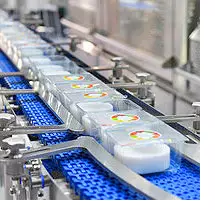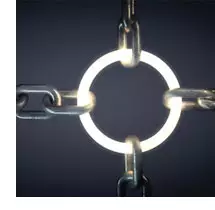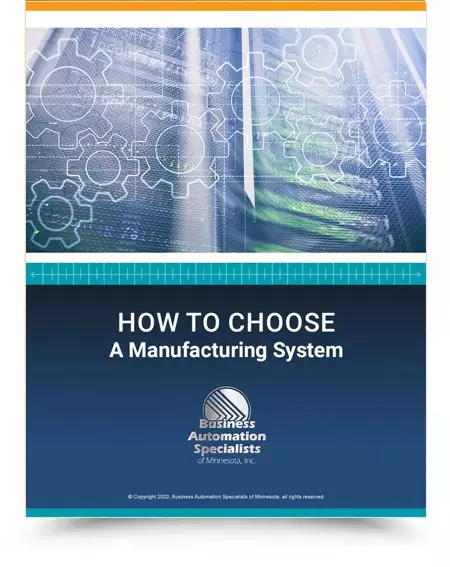Author, Ron Ketterling
The 10 Most Effective Methods to Reduce Manufacturing Costs
Companies that thrive and succeed have effective ways to reduce their manufacturing costs. In this blog, we’re highlighting the most effective manufacturing cost reduction strategies.
“We see it all! Companies thriving in the most competitive environments, and companies that should be thriving. Those that “should be”, come to us looking for better ways to do things, streamline systems, reduce manufacturing costs and increase profitability.”
Ron Ketterling, Founder & President, Business Automation Specialists, Inc
Our most successful clients focus on ways to improve costs, profits, and flexibility by reducing manufacturing costs. Manufacturing cost reduction efforts can result in significant product cost savings, manufacturing cost saving, and life cycle cost saving. As a result, companies that implement all ten of the following strategies for manufacturing cost reduction see the greatest level of success..
1. Reduce costs associated with product planning and design
Since product development determines 80% of product cost, it makes sense to start here when looking at reducing manufacturing costs. In fact, the concept/architecture phase alone determines 60% of the cost. Product architecture determines product definition, technology, team composition, technology, part combinations, and off-the-shelf parts.
Manufacturing costs can be reduced simply by spending more time in the planning stage rather than rushing to start the design and production process. Up-front preparation allows teams to discover problems prior to design, saving the time, cost and frustration of change orders to fix faulty designs.
Effective planning requires developing a team of key department personnel (engineers, manufacturers and designers) and vendors to discuss the product. With the experience and expertise of each team member, the design of the product will be thorough, and most problems will be discussed and solved prior to their occurrence.
Prior to design, the product must be defined. Often, design starts with a poor product definition and requires change early on for redefinition. Taking the time to carefully define the product and the goal of its production will not only save you multiple change orders, but it will also result in a better product overall.
Defining the product requires that you know who your customer is and what the customer wants. This is a good time to make sure that you have an active partnership between your marketing department and the rest of your team (engineering, manufacturing, etc.).
You may have a design concept meant for a sophisticated buyer, but perhaps the market opening is for the first time buyer who is looking for a simple product with a low to moderate price point. Your design may not fit that market. Explore the concept with your marketing team. Get some first-hand advice from consumers. Defining the product begins by defining the buyer and end-user (the buyer may be someone other than the end-user.)
The planning phase also determines strategies for manufacturing, supply chain, vendors, quality, reliability, service, variety, configuration, customizations, and derivative products. These decisions have the highest impact of all manufacturing cost reduction strategies.
These decisions include:
- Designing to minimize part cost and material overhead, a huge component of which is buying off-the-shelf parts
- Designing out quality costs, where the return on investment doesn’t warrant the cost of the quality
- Eliminating change orders by focusing more time on the planning stage
- Focusing on vendor-partnerships that can build value and ultimately reduce manufacturing costs
Although many companies view the planning stage as a waste of time, it is crucial to reducing overall manufacturing costs. It not only saves time, but it also eliminates costly errors and change orders during design and production.
2. Focus on vendor/partner relationships
After spending a significant amount of time in the planning stage attempting to minimize part costs and reduce the cost of quality, companies must focus on a crucial cost-savings strategy: vendor/partner relationships.
By focusing on vendor/partner relationships that build value, companies will reduce their design and manufacturing costs significantly. Instead of sending out bids to multiple vendors, build long-term relationships with vendors and partners. This unique relationship with specific vendors and partners will not only save you more money than sending out for multiple bids, but it will also save you a significant amount of time.
These relationships save costs because vendor/partners understand and operate according to DFM guidelines, know their own process capabilities, and can help company engineers avoid making costly mistakes that could raise costs, delay delivery and compromise quality. The vendor’s engineers can also work with your company’s engineers to design low-cost tooling, which can be used to produce higher quality parts.
Vendors and companies can learn from each other and strive to make each job better, faster and less expensive overall. These relationships provide the lowest total cost because:
- Vendors understand the challenges and issues faced by your customer
- Vendors make suggestions early in the process that will maximize manufacturability
- Vendors work with you early in an effort to keep the total cost to a minimum
As you can see, vendor-partner relationships are crucial to reducing manufacturing costs in the design stage. By focusing on building these important relationships, you can minimize the total cost of design and continue to reduce manufacturing costs.
3. Reduce overhead manufacturing costs with build-to-order and mass-customized inventory
Your company can take advantage of two key strategies to cutting overhead costs in manufacturing: one is to produce standard products that can be built to-order without forecasts or inventory, while the other is to produce special products through mass-customization on-demand.
In both approaches, once a confirmed order for products is received, products are built. The results can be staggering. Inventory carrying costs can be eliminated (the standard “rule of thumb” for inventory carrying cost is 25% of the inventory value on hand) and procurement costs can be reduced with automatic, on-demand resupply. What’s more, better responsiveness may lead to more sales.
4. Standardize parts to reduce manufacturing costs
With build-to-order and mass customization strategies, manufacturing cost reduction is realized at the parts and raw materials level. Standardization supports the fundamental concept of build-to-order and mass customization in that all parts must be available at all points of use, which eliminates the setup to find, load, or kit parts.
Standardization reduces the number of part types and makes it easier for parts to be pulled into assembly. Fewer types of parts ordered in larger quantities will reduce part and material overhead cost. Floor space reduction, overhead cost cuts, and time saved in setup, logistics and supply chain management are additional benefits. Other types of standardization which can also affect cost include tools, features, raw materials, and processes.
Since cost cannot be removed after the product is designed, standardization must be considered when designing the product. The designers, engineers, manufacturers and purchasers should work together throughout the entire design to figure out the best way to standardize parts.
A huge component to minimizing part costs is buying off-the-shelf parts. Buying off-the-shelf parts can save considerable amounts of design and production time as well as save on costs and help the company focus on the real mission of designing and building quality products. Suppliers of off-the-shelf parts are often more efficient at their specialty, producing high-quality, reliable, and warranty-covered parts that you could not have produced on your own.
Minimizing material overhead costs is also crucial to cutting costs in the design stage. Consider the drivers behind the costs in your material overhead and plan an effective way to reduce or eliminate those drivers. Negotiate with vendors and suppliers to reduce procurement costs and minimize inventory costs wherever you can.
By purchasing off-the-shelf parts and minimizing material overhead costs, companies can work cost savings into the product design itself. These substantial up-front savings greatly reduce the overall manufacturing cost of the product.
For more on how standardization reduces costs, read our blog about it here!
5. Rationalize the product line to focus on the most profitable products
Rationalization of the product line and all of its component parts is an often-overlooked opportunity to simplify operations and free up critical resources. Product line rationalization focuses on the most profitable products and eliminating or outsourcing low-profit products that have high overhead demands and are not compatible with manufacturing cost reduction strategies.
Experience with first-time product line rationalization efforts suggests that more than 60 percent of a product line contributes less than 10 percent of the total margin. Successful rationalization initiatives have cut total supply chain management costs up to 50 percent and improved performance on inventory turns up to 100 percent among top industry performers.
6. Simplify supply chain management
Rationalization also aids in the simplification of supply chain management. The most unusual (often low-profit) products are typically made with hard-to-find parts. By rationalizing these products away completely, your supply chain is instantly simplified.
In addition, establishing vendor partnerships and involving them on product design is another method in supply chain simplification. As part of the design team, vendors can recommend low-cost products that will be readily available for product creation. We frequently see too many vendors for the same products. While this may result in a few pennies in savings, the cost in purchasing and payables time may exceed this savings. When you factor in the extra requirements for put-away (and source traceability if you are in a regulated industry) and picking, you are probably in a negative situation.
Overall, simplifying supply chain management can be beneficial in reducing manufacturing costs and improving the manufacturing process. Simplifying all parts of the process, including planning, sourcing, production and delivery, saves costs and improves efficiency and quality of products.
7. Evaluate the cost/benefit of quality
Quality cost reduction is an important step in reducing manufacturing costs. Without continual assessment of and improvement upon the manufacturing process, the cost of quality can be 15% to 40% of total revenue. Quality costs reductions produce an increase in profits.
The first step to eliminating quality costs involves designing in quality. This method assures high quality and reliability through the design of the product, preventing costly errors, defects, reworks, and overhead demands. Designing in quality requires a significant amount of planning and preparation. Simplifying designs, taking past quality problems into consideration, automating processes, and thoroughly documenting every step of the design are all steps to reduce quality costs.
Reducing the cost of quality also includes designing products for the minimum quality costs. To determine the minimum quality costs for the product, you must calculate the total cost. Since cost of quality should be the first cost driver to be quantified by total cost, the minimum quality cost should be easy to determine. Ask yourself the following questions when determining the minimum quality cost:
- How low can the cost go without compromising the integrity of the product?
- Where can the design of my product be simplified?
- How does the cost of quality impact the total cost?
Minimizing quality costs to yield a greater ROI also requires understanding quality issues and capitalizing on lessons learned in the past. It requires thorough up-front work so production teams can optimize quality by design, as well as interdepartmental teamwork to address all potential issues before entering production.
Extensive planning and preparation are required when reducing quality costs, but the results are worth the effort. Simply reducing quality costs can increase sales by creating a higher-quality profit and greatly reduce overall manufacturing costs.
In addition, rationalizing products is a way to reduce quality costs. Rationalizing away unusual, low-profit and low-volume products raises net factory quality. Thus avoids wasting quality resources on inherently lower quality products.
8. Implement Lean Manufacturing/Production Principles
Adopting lean manufacturing principles can reduce manufacturing costs by increasing labor productivity, cutting production throughput times, reducing inventories, and cutting errors and scrap by as much as half. The core principle of lean production is to do more with less; the first place to focus is eliminating waste.
Waste is defined as any activity that does not add value from the customer’s perspective. According to research conducted by the Lean Enterprise Research Centre (LERC), 60% of production activities in a typical manufacturing operation are waste – they add no value at all for the customer. The good news, just about every company has the opportunity to use lean manufacturing techniques to cut manufacturing costs.
A great place to start implementing lean production is by understanding the forms of waste and how to eliminate them. Waste can take many forms, such as overproduction, waiting time, excess inventory, over-processing, defective units, and transportation.
After waste has been eliminated, companies must then assess their inventory costs. By reducing all in-process or current inventory, businesses can lower costs and, ultimately, raise their profits.
For more on how to implement lean manufacturing, check out this blog post!
9. Know how to measure, track, & report manufacturing costs including total cost measurement
Total cost measurement focuses on calculating the total cost savings to encourage and support continual savings. Implementing total cost measurement begins with the cost driver approach. Cost drivers are the deep-down root causes of a cost. Recognizing the hidden factors behind the costs will provide you with more accurate and relevant information, as well as encourage further efforts to lower manufacturing costs.
It is vitally important to identify major cost drivers and the costs associated with them. A company’s overhead expenses can give significant insight into cost drivers. Some cost drivers are not linked directly to overhead costs, but the overhead can contain costs related to important cost drivers. Look at the drivers behind costs that are not defined as direct material or direct labor and how those costs impact total expenses.
The total cost needs to be quantified so everyone must make decisions with total cost in mind. Linking cost with the behavior and characteristics of products or customers will reveal areas that need cost and investment reduction. Senior management needs to make decisions based on total cost. They need to realize the importance of quantifying total cost by implementing total cost measurements. Ultimately, this will reduce manufacturing costs and transform your company.
10. Use the RIGHT Manufacturing System
The most important tool needed in your cost reduction efforts is a way to measure, manage and analyze the data associated with each of these processes. In other words—you need an ERP!
Many companies feel they are too small for an ERP system. Others feel the cost and time involved to implement ERP systems couldn’t possibly provide a return on the investment. Yet these companies likely don’t take into consideration the overall positive impact ERP systems can have on an organization. Manufacturers that have already implemented ERP are:
- Improving their inventory accuracy
- Experiencing faster month-close completions
- Meeting internal manufacturing schedules
- Shipping more orders complete and on time
- Streamlining and accelerating processes to improve efficiency and productivity
- Standardizing business processes
- Optimizing current capacity
Pressures to reduce costs, improve the overall customer experience and response time, and manage growth expectations are the norm. Having an ERP system in place to manage these pressures is crucial to surviving in the new economy. The business benefits achieved by manufacturing companies with ERP systems are measurable and the industry average results are significant:
- 13% reduction in operating costs (best-in-class is 20%)
- 10% reduction in administrative costs (best-in-class is 18%)
- 11% reduction in inventory (best-in-class is 22%)
- 12% improvement in internal schedule compliance (best-in-class is 18%)
- 13% improvement in complete and on-time shipments (best-in-class is 17%)
You can see payback in as little as twelve to eighteen months.
An ERP provides a foundation for managing resources and business processes. This enables internal collaboration and organization, which improves business processes. Companies that use ERP systems have a baseline from which to build standardization and provide all users visibility to information and processes. This provides the foundation for organizational change and growth.
Best-in-class companies are three to four times more likely to have internal collaboration capabilities over companies without ERP systems. Even companies with ERP systems that perform below the industry average are 59% more likely to integrate and coordinate manufacturing operations with customer service, logistics, and delivery.
Additionally, companies with ERP systems have visibility into their business processes and can quickly dig into details to make informed decisions and spot issues before they become problems. In fact, reporting capabilities—especially financial reporting—can be a key reason to implement an ERP system. Just over 10% of the companies without ERP systems have a single system of record keeping. For the remaining 90% of companies without an ERP, the implementation of an ERP system could be justified by the labor costs needed to respond to one audit alone.
Choosing the right system to reduce costs is challenging. We developed a free guide on “How to Choose a Manufacturing System” to help you with the process. Download your free copy today to see if your current system is a help or a hindrance to reducing your manufacturing costs. Learn more about using Microsoft Dynamics 365 Business Central as your manufacturing software.










